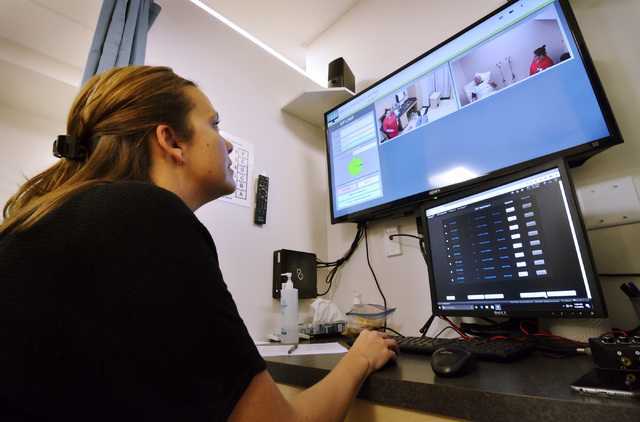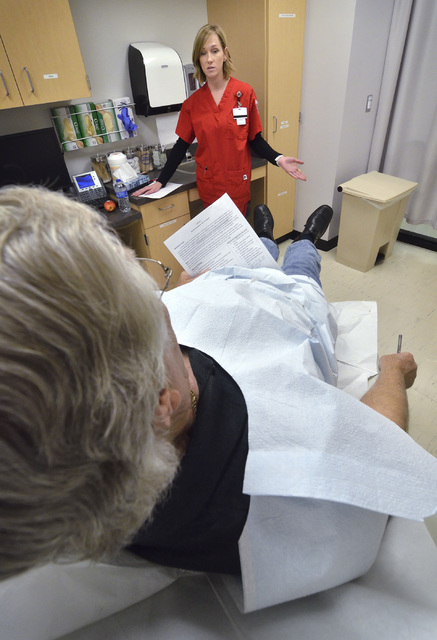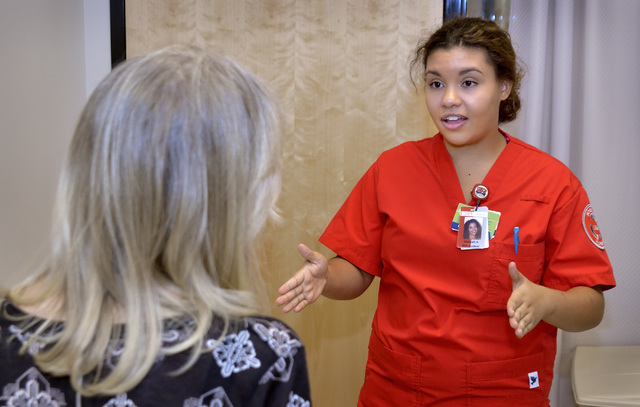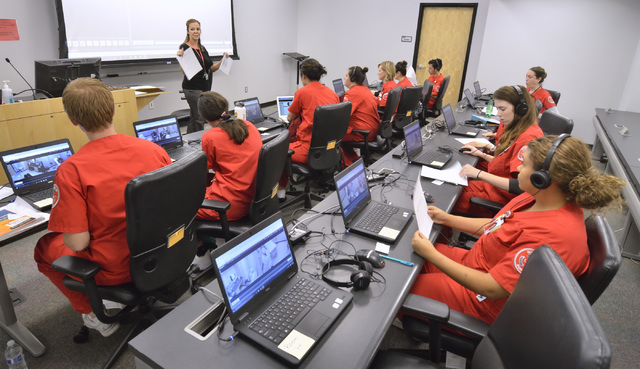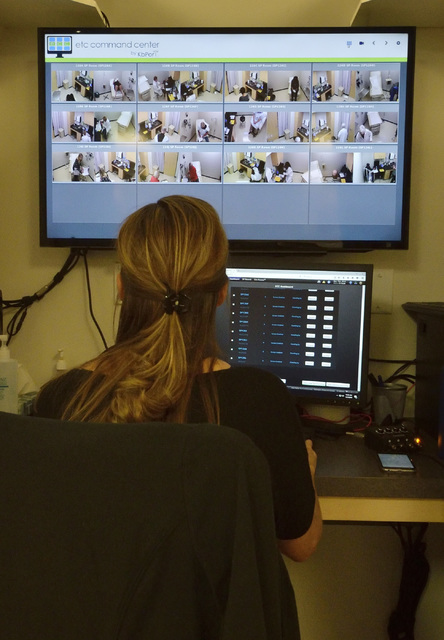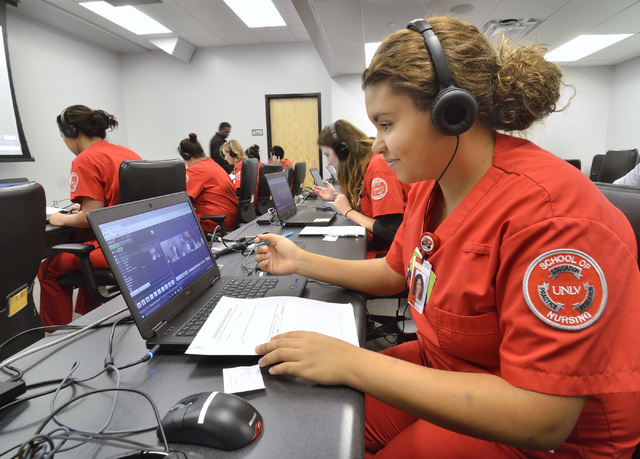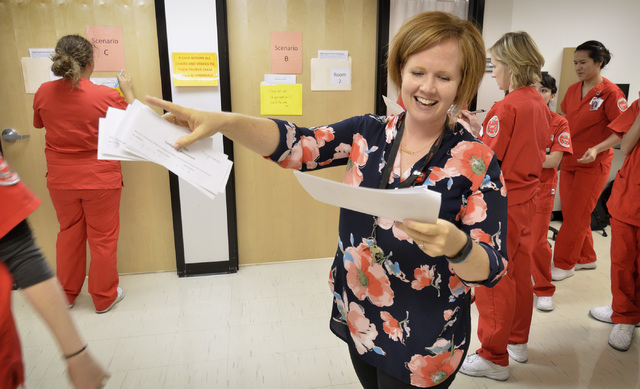Actors help UNLV nursing students simulate difficult real-life encounters
No nurse — in fact, no patient, no wide-eyed puppy, no sentient creature anywhere — should ever have to face Dr. Sandy Beirle when she’s looking for missing lab results.
Take Caitlin Bagwell, a student at the UNLV school of nursing, who recently walked into an examination room and offered Beirle an innocent “Good morning.”
“No, it is not a good morning,” Beirle responds in a tone sharper than a fresh scalpel. “If it were a good morning, that (computer) screen would not be blank.”
Things go downhill from there. But luckily for Bagwell and anybody else within earshot of the awkward scene, Beirle isn’t really a rude, unforgiving doctor but, rather, an actress playing the part of an intimidating doctor during a training simulation for UNLV nursing students.
The goal is to present nursing students with difficult situations they probably will face on the job and help them improve the interpersonal communication skills they’ll need when that happens.
In addition to that intimidating doctor scenario, students also would encounter a frustrated patient and a patient who is reaching the end of his life.
Janelle Willis, a lecturer in the UNLV school of nursing, says the exercise comes at the end of students’ second semester of studies. Each encounter is recorded on video, which students then watch and evaluate, analyzing their body language and comments to examine what they might have said and how the encounter could have been made more effective.
“They hate watching themselves,” Willis says, “but they can’t deny video.”
On the upside, Necole Leland, a lecturer in the nursing school, says students usually “think, ‘I did horrible’ when they go through the simulation, and watch it over again (and say), ‘Oh, I guess I didn’t do so badly.’”
Another common reaction, she says: “You could tell I was super-nervous.”
That’s understandable, because the actors playing doctors and patients are from Speeding Theatre-Over 55, a Las Vegas theater troupe of actors ages 55 and older. Thanks to both the actors’ talents and life experiences, the encounters with students seem startlingly real.
Chrys Oswald is playing a frustrated patient. It’s her second performance as a nursing school simulated patient.
“I died 12 times before, and I had nightmares for a month afterward,” she says, smiling. “I told them I’m not dying this time.”
When student Maliyah Hamilton enters the room, Oswald tells her that she has been in the hospital for three days and that “I’ve not seen a doctor for two days. Can you please help me find out what’s going on here?’”
Hamilton admits she doesn’t know what’s going on, but tells Oswald that she’ll summon a doctor who “can help you feel better and get you home.”
Oswald tells Hamilton that she hasn’t had a bath in three days and that nobody stops to check in on her. “It’s just drive-by,” she says. ”It’s like a McDonald’s.”
Oswald tells Hamilton she needs medications. Hamilton promises to check her chart to see “what pain meds you are taking so we can get you out of pain.”
Oswald tells Hamilton that she has no family at the hospital and that she doesn’t have anyone to advocate on her behalf. “I will definitely be your advocate today,” Hamilton assures her.
Hamilton says later that her immediate priority was to unpack Oswald’s complaints so they could be addressed one at a time. After watching video of the encounter, Hamilton also notes that she has a tendency toward “politely interrupting.”
During the next round of encounters, student Kimberly Arnold meets with James Bailey, playing the part of a patient who is struggling with the knowledge that he is dying.
“I’ve been here two, three, four days,” he tells Arnold.
“Did you talk to a doctor today?” she asks
“No, he doesn’t come around,” Bailey says. “When you’re dying, no one cares, you know?”
Bailey tells Arnold that he has had cancer for three years and that his doctor “seems like he doesn’t know what he’s doing.”
Arnold lets Bailey express his fears, offering sympathy and encouragement when he confesses to her that he thinks God is punishing him. The discussion takes a turn, moving from the medical to the philosophical.
“It’s hard,” Bailey says. “When you’re dying, you’ve got to give up everything.” Arnold encourages him to spend whatever time he has left creating “new memories” with his family.
When the session ends, Bailey smiles. “You’ll make a good nurse,” he tells Arnold. “You can be my nurse anytime.”
“I’ve never had a death-dying experience,” Arnold says later, but “I tried to feel like, if I was lying there, what would I want to do?”
Willis says the end of life and intimidating doctor scenarios tend to be consensus picks as the trickiest. Bagwell tells Beirle during their intimidating doctor interaction that she doesn’t know anything about the lab results Beirle is seeking, but will track them down.
“You’re interrupting me,” Beirle snaps. “What you’re doing is making excuses.”
Then things take an unexpected turn. “You’re making excuses for somebody,” Beirle says. “Who are you dating? Are you dating somebody you’re making excuses for?”
Bagwell, surprised, says she isn’t and again offers to find the results. She accuses Bagwell of arguing with her.
“I’m the doctor, you’re the nurse. Don’t argue with the doctor,” Beirle says.
Finally, the announcement comes that the encounter is over, as Beirle gets one last “Get out of here” into the encounter.
Then Beirle smiles and gives Bagwell a hug. A relieved Bagwell smiles.
Bagwell admits she was “taken aback. I felt very disrespected as a nurse.
“All I wanted to do is try to handle this together, but she wasn’t having it. She just tried to push the blame on me.”
A smiling Bagwell tells Beirle that she was very convincing as an intimidating doctor. Beirle laughs.
“You should talk to my daughter,” Beirle jokes.
Read more from John Przybys at reviewjournal.com. Contact him at jprzybys@reviewjournal.com and follow @JJPrzybys on Twitter.



